What Career Is Best for My Child?
By Peter T. Guy, Ph.D. and Renata Skawina, CHRL, CPCC, ACC
Are you a parent who struggles to help your child choose a school or career that will fit them best? Do you worry if the choice is correct and if the tuition investment will pay off?
Parents whose children are at the stage of choosing their undergraduate studies and future careers often are experiencing extreme stress, regardless of their country or continent of residence.
Research shows that 61% of US college grads would change their majors if they could go back.
Moreover, within three (3) years of initial enrollment, about 30 percent of undergraduates in associate’s and bachelor’s degree programs had declared their major had changed at least once.
After college, many graduates do not end up working in the profession aligned with their post-secondary education and feel like they wasted time and money.
It is much easier to assist when a child displays evident passion and talent in a specific area. But what about directionless children? They may have interests in many different areas but don’t know what would be the most fulfilling for them or which direction to go for a degree or career. Both parents and children feel the pressure and overwhelm caused by the decision to determine future success.
In good faith, many parents often try to persuade their children to choose the same career as they did because it worked well for them and gave them a decent living and prestige. Unfortunately, it does not always work this way for the child. Repeatedly, children try to please their parents by choosing a similar career, and they may even be successful in it, but the question is, are they happy? Do they feel fulfilled and enjoy their work?
The issue of choosing the right career is a broader social problem. Young people are often left without any specialized help to determine their interests, talents, passions, and competencies. There is very little guidance in finding the best match that will positively impact the individual and maintain their motivation throughout the university and professional careers.
Lack of professional support forces kids to give in to parents’ persuasions, follow friends’ choices, or pick a career that seems ”cool” or most profitable. Often these choices are later related to a “mid-life” crisis when the now-adult realizes they do not love what they do and are desperately looking for a change.
The dissatisfaction can quickly turn into aggression and pessimism, which often affects the entire family and workplace dynamics.
And what about the parents who are too busy in THEIR professional lives? They often cannot take the time to talk with their children and ask the right questions. They are preoccupied and leave their child without any help or direction.
On paper, there is some support in secondary schools where dedicated counsellors are trained to hold these conversations with the students. However, this help is illusory more often than not because the counsellors are not fully equipped with tools to identify the student’s strengths and support or validate their best fit. Usually, achieving a successful alignment depends on the counsellor’s experience, patience and determination to help.
A counsellor’s only practical assistance is when a student shows an undeniable talent in a specific area, such as music or mathematics. The advice then focuses most on the best program and school for that particular interest. Often, there is very little the counsellor can offer to an “average” or broadly talented student.
The worst part is that parents, children, and teachers experience this problem worldwide. The Optimax statistics are shocking based on the analysis of over 5,000 US and Canadian students and over 2,000 EU students.
School counsellors are advising only 9% of students who aim to become designated professionals, but 63% of students must seek help from friends and family. 28% of students have to decide their career path on their own (Fig. 1).
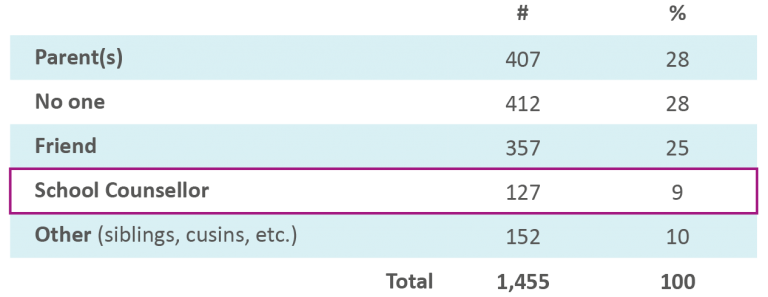
Fig. 1.
This data is complemented by Optimax detailed statistics from Ryerson University in Toronto, where 58% of first-year students at the School of Business Management have no idea what profession or job they will choose in the future.
So much physical, financial, and emotional effort goes into the wrong education. All of it negatively impacts parental relationships and children’s future professional lives, and it can further translate into increased stress, mood disorders, and tense family dynamics.
If you resonate with the above, what if you could provide a clear blueprint to your child that helps to save precious time, optimize their potential, build self-image authentically, boost confidence, and make the right career decision?
Based on the scientific Cybernetic Theory of Character (psychocybernetics) by Prof. M. Mazur (not related to Maxwell Maltz’s work), The Optimax Human Performance Inc. has developed a Career Orientation Program to pragmatically assist students in their career choices by identifying their passions, talents, and competencies. Students complete an online Optimax Character Assessment to determine a vocational orientation, which captures over 500 human character parameters. The combinations of these parameters create countless options, helping to match everyone with a job or career.
To see how it works, let’s follow an Optimax Program example. Below are the results of the interest assessment based on a real case (Fig. 2).
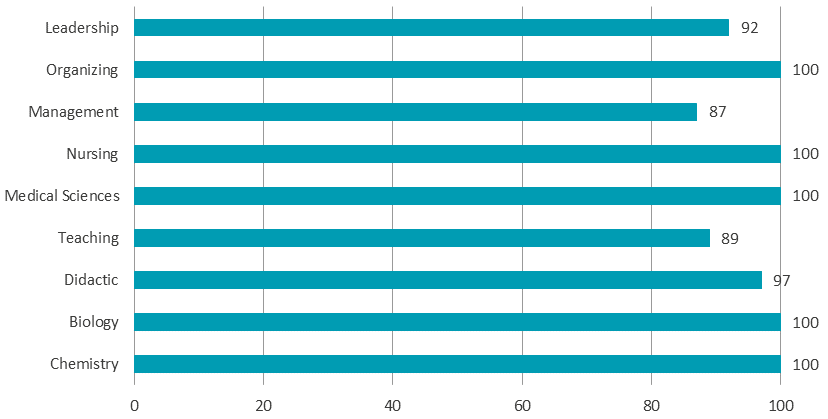
Fig. 2.
These results tell us the following:
- Extremely high interests in biology and chemistry create great potential in biochemistry.
- High didactic and teaching scores predispose this person to a teaching profession.
- Extremely high interests in medical sciences and nursing suggest an area in medicine.
- High scores in leadership, organizing, and management predispose the individual to management within an organization with a high potential to reach an Executive level.
In this case, the best choice would be in any of the above fields of study. However, it does not tell us what profession to pursue, and most importantly, how to plan a professional career.
Here again, Optimax comes to the rescue. Figure 3 shows an example of what career development milestones may look like for an Executive.
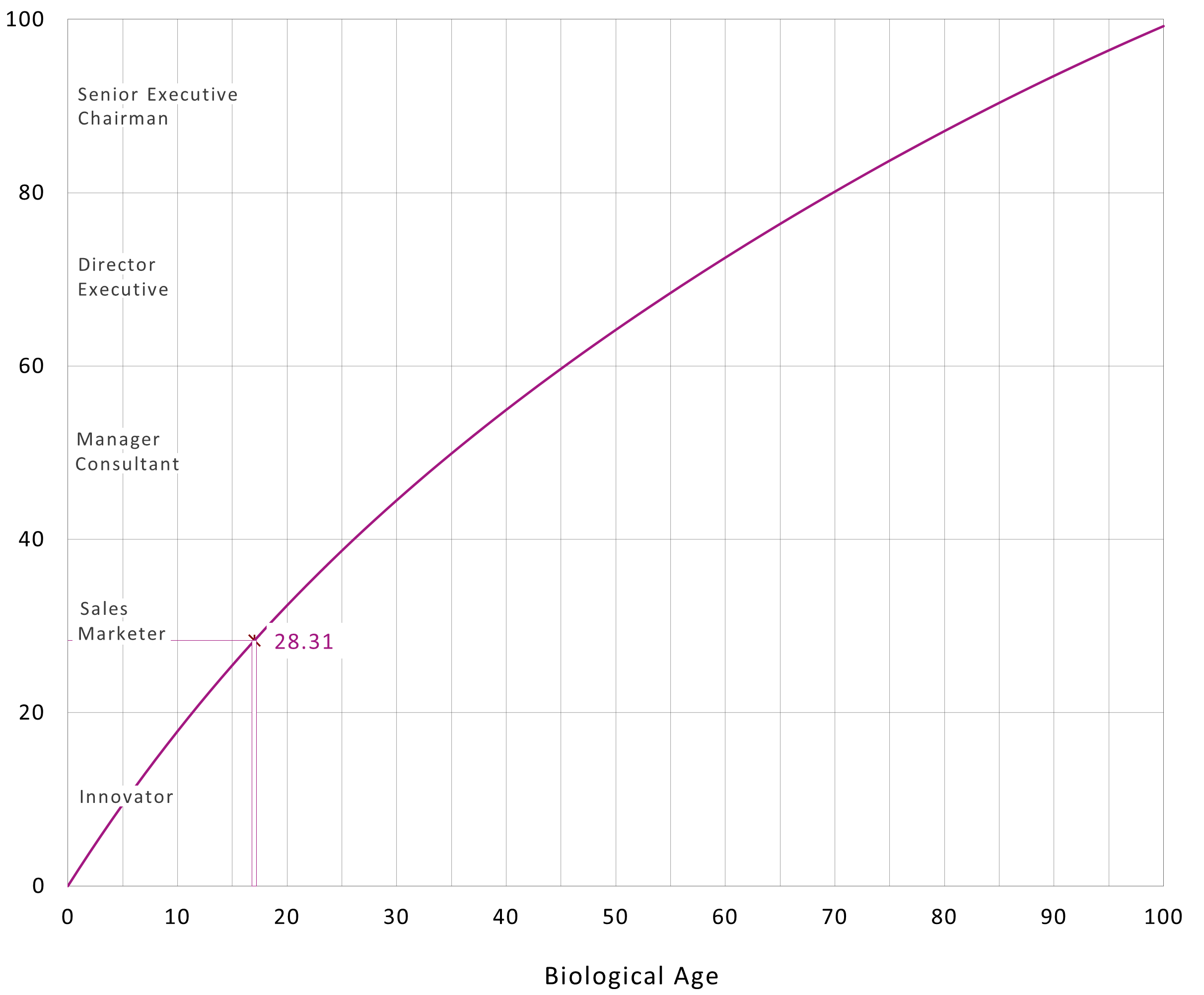
Fig. 3.
Note: 28.31 is the present level of career development at age 17.
The graph represents a path to a Senior Executive level at age 70. It estimates the age in each subsequent level’s progression, so in our example of Executive/Director level at age 45, starting the Management career at age 26. By understanding each milestone and its timing, the individual can invest specific training and development efforts and know when to expect each milestone’s completion.
Continuing with our example, Figure 4 also shows that the person has high memory (necessary for studying medicine) and high intelligence, which validates the ability to grasp the complex concepts essential for the suggested career path.
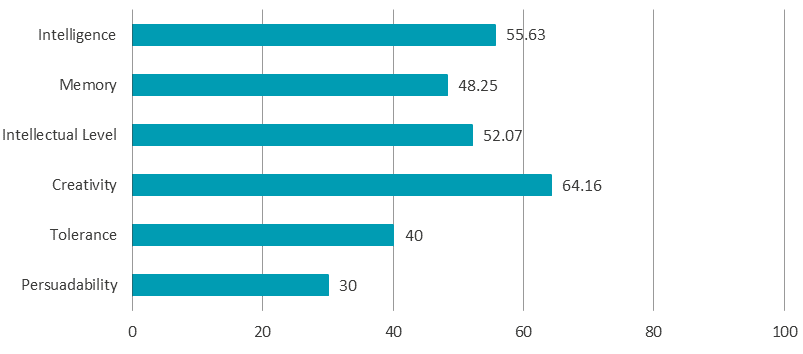
Fig. 4.
- Undergraduate studies in the field of biochemistry (high scores in biology + chemistry parameters).
- Graduate medical studies (high scores in medical sciences + caring + biology + chemistry + organizing + management parameters).
- Ph.D. in biochemistry in medicine, e.g. cancer research (high scores in medical sciences + caring + biology + chemistry) or pharmacology (again, medical sciences + biology + chemistry).
- A professor’s career at a University as an educator and scientist (high scores in didactic + teaching + biochemistry + medical sciences parameters).
- Possibly a hospital director around 45 years of age (high scores in leadership + organizing + management + caring + medical sciences + biochemistry parameters, plus the achievements and experience as a professor).
It is also worth mentioning that, on average, the intelligence and memory scores between 20-30 are enough to be successful in a job, provided it matches well with the individual’s competencies, interests, talent, and passions.
Below is yet another detailed example of career development in the information technology field (Fig. 5). Here, the person can expect to achieve a Management position at age 27 and an IT Executive Director position at around 45 years of age.
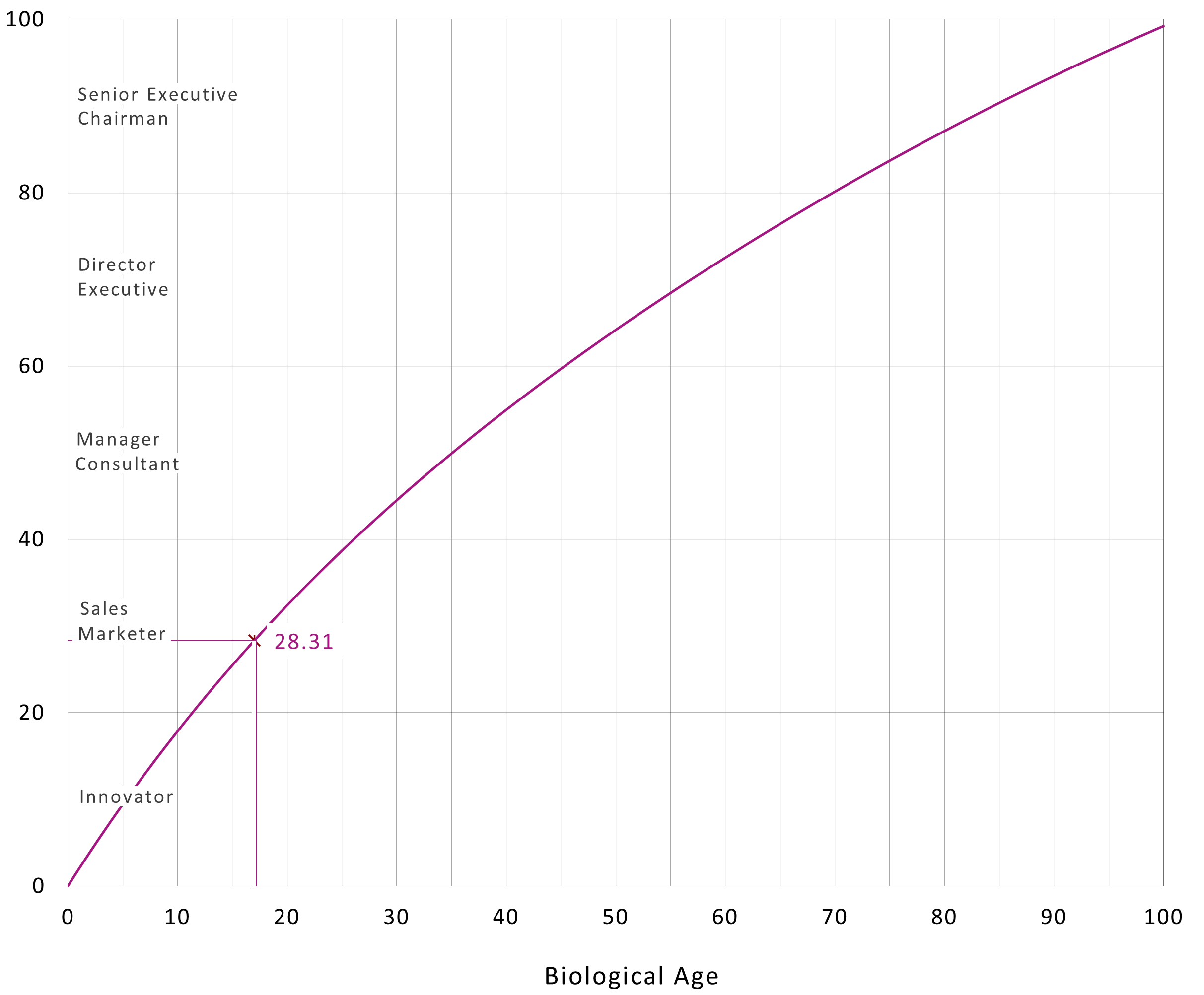
Fig. 5.
The precise plan ensures that the parents and young adults know what to do when to do it, and how to progress.
For over 30 years, Optimax has helped parents and students choose the right career path globally with a very high accuracy rate, saving them time and money. The assessment is 95% accurate. It does not have to be retaken periodically, and it provides precise future predictions. It has an excellent reputation in corporations, high-level military, and among athletes. For examples of our clients, feel free to visit: Clients.
The following are just a few testimonies of satisfied customers:
I took the Optimax test in high school nearly 15 years ago. The results of the assessment clearly indicated a career as a scientist in the field of biochemistry. Back then, I had no idea what biochemistry was. Today, I am a happy University professor conducting biochemical research on cancer.
Natasza K.
The Optimax results made it very clear to me which path to pursue and helped me easily make the decision to go into engineering.
Sam M.
Thanks to Optimax, we were able to save time, money, and frustrations as it helped us direct my son and pick education and profession that got him to enjoy and perform in his career and life.
Kathy B.
My oldest son was about to begin his last year in high school, and, like many of his friends, he really was not certain as to what he wanted to pursue as a career. With Optimax’s help, it became clear that my son was a good fit with either engineering or business but at this stage of his life and given his interest in wanting to know how things work, engineering was the best fit.
Maurice M.
Optimax has been the single greatest influence in my life that guided me to walk away from a continuously successful career in the corporate arena and to become an independent professional, where I have come to appreciate the freedom, the challenges, the lessons, and the possibilities of the future. I have never looked back.
Dragica G.
I strongly encourage you to spend the money and take this test. This program is definitely a success, and I hope to make this mandatory for students to take in all universities.
Kelsey B.
